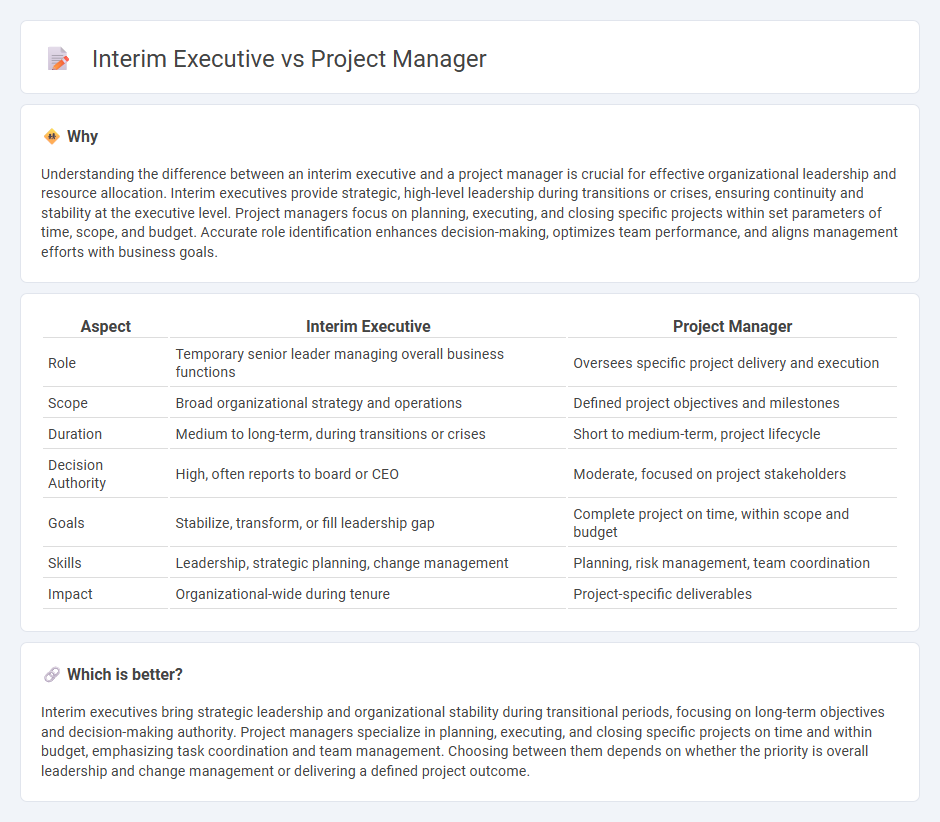
Interim executives provide temporary leadership during transitions, driving strategic decisions and stabilizing operations to maintain continuity within organizations. Project managers focus on planning, executing, and closing projects, ensuring objectives are met on time and within budget. Explore the distinct roles and benefits of interim executives and project managers to enhance your management approach.
Why it is important
Understanding the difference between an interim executive and a project manager is crucial for effective organizational leadership and resource allocation. Interim executives provide strategic, high-level leadership during transitions or crises, ensuring continuity and stability at the executive level. Project managers focus on planning, executing, and closing specific projects within set parameters of time, scope, and budget. Accurate role identification enhances decision-making, optimizes team performance, and aligns management efforts with business goals.
Comparison Table
| Aspect | Interim Executive | Project Manager |
|---|---|---|
| Role | Temporary senior leader managing overall business functions | Oversees specific project delivery and execution |
| Scope | Broad organizational strategy and operations | Defined project objectives and milestones |
| Duration | Medium to long-term, during transitions or crises | Short to medium-term, project lifecycle |
| Decision Authority | High, often reports to board or CEO | Moderate, focused on project stakeholders |
| Goals | Stabilize, transform, or fill leadership gap | Complete project on time, within scope and budget |
| Skills | Leadership, strategic planning, change management | Planning, risk management, team coordination |
| Impact | Organizational-wide during tenure | Project-specific deliverables |
Which is better?
Interim executives bring strategic leadership and organizational stability during transitional periods, focusing on long-term objectives and decision-making authority. Project managers specialize in planning, executing, and closing specific projects on time and within budget, emphasizing task coordination and team management. Choosing between them depends on whether the priority is overall leadership and change management or delivering a defined project outcome.
Connection
Interim executives and project managers share a strategic focus on driving organizational change and achieving business objectives within defined timeframes. Both roles require adaptive leadership, expertise in resource allocation, and strong stakeholder communication to ensure project success and continuity during transitional periods. Their collaboration accelerates decision-making processes, minimizes risks, and enhances operational efficiency in complex management environments.
Key Terms
Project Manager:
Project managers specialize in planning, executing, and closing projects within defined scopes, budgets, and timelines, ensuring team coordination and stakeholder communication drive successful outcomes. Their expertise includes risk management, resource allocation, and performance tracking, optimizing project delivery efficiency and client satisfaction. Discover more about how project managers enhance organizational success and streamline complex initiatives.
Scope Management
Project managers specialize in defining, controlling, and delivering project scope within specific timelines and budgets, ensuring clear objectives and deliverables are met. Interim executives oversee broader organizational change, aligning scope management with strategic goals and adapting project boundaries to evolving business needs. Explore how the distinct approaches to scope management impact organizational success and project outcomes.
Timeline
Project managers typically operate within defined timelines, overseeing specific projects from initiation to completion to ensure goals are met on schedule. Interim executives engage over variable durations, stepping in to provide leadership during transitional periods or until a permanent appointment is made, often focusing on broader organizational strategy. Explore detailed comparisons to determine which role suits your timeline needs best.
Source and External Links
Project Manager - A project manager is a professional responsible for planning, procuring, and executing projects across various industries, ensuring they are completed on time and within budget.
How To Become A Project Manager: The 2025 Guide - This guide covers the essential skills, certifications, and practical tips necessary to become a successful project manager in 2025.
What Does a Project Manager Do? - Project managers are responsible for day-to-day management of projects, focusing on scope, schedule, finance, risk, quality, and resources to ensure successful project outcomes.
 dowidth.com
dowidth.com